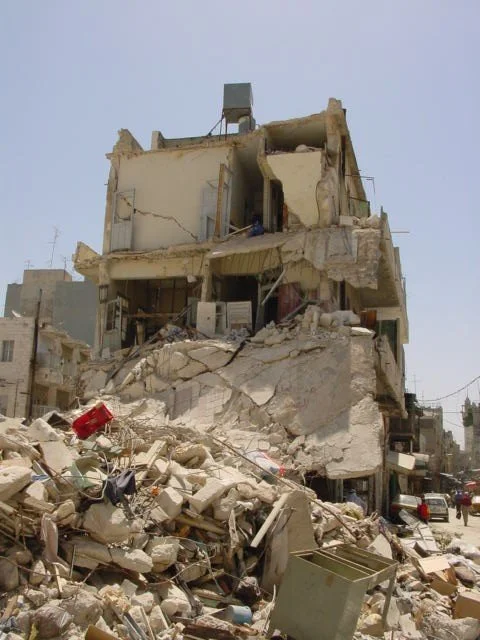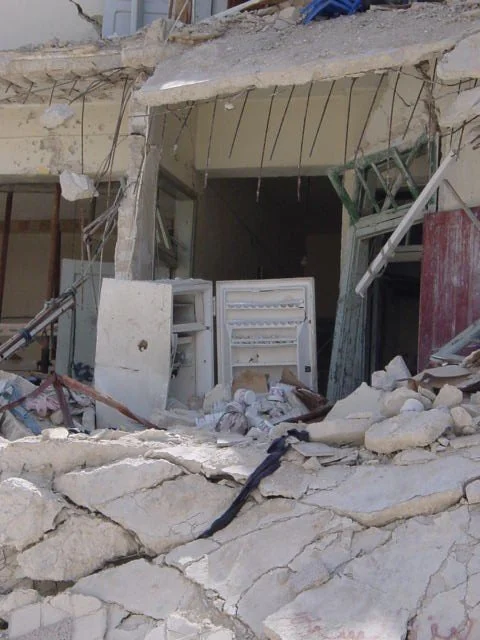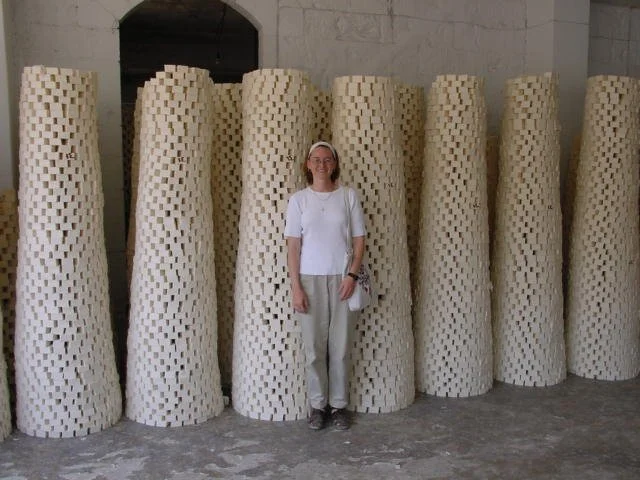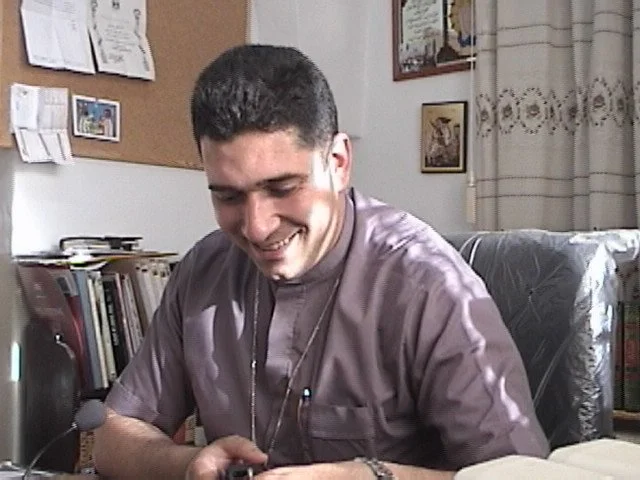June 11, 2002
We slept in today, a rare treat for us in our curtain-challenged sun-enters-early Zababdeh apartment with hi-fi-rooster-acoustics. The weather, while still warm, has cooled off considerably today.
Scenes like this are all-too-common in places like Nablus.
We headed towards the busy center circle, passing through the Old City, which Elizabeth hadn't seen since the April siege. It is amazing to see several-foot thick stone walls destroyed, and to imagine the firepower necessary for that. The worst damage was still not as comprehensive or expansive as in Jenin Camp, but it was still very disturbing. The estimates are that more damage - in terms of both lives and dollar figures - was done here.
More destruction from the Israeli incursions into Nablus.
From there, we hiked up to the Latin School. The teachers and administrators were finishing up their marks for the year, so we had a short but very pleasant visit. The school was once run by St. Joseph sisters, and is still known by that name around the city (though there are no longer any sisters there). It sits up on a beautiful hill overlooking the hustle and bustle of Nablus. The school is home to four hundred students, from kindergarten to eighth grade, sixty of whom are Christian - probably the entire Christian population of Nablus for children that age.
Elizabeth stands in front of towers of Nablus’ famous handmade soap.
We headed back down to the Circle to visit one of Nablus' central tourist attractions, the old soap factories. This one sits just outside of the Old City and is the only one still in operation in the city - two were destroyed in recent Israeli incursions, and two more have simply stopped production due to the crumbled Palestinian economy. We are treated to a cool yogurt drink and a tour from the proprietor, whose great-great-grandfather started the business. For four days, the olive oil (imported from Italy - most local oil is consumed by families, and so there's not enough left to buy for soap production), caustic soda, and water are heated and turned in huge vats. Then, the resulting "soup" is poured out across a huge floor, leveled off, and cooled for a day. Then soap workers stamp the firming soap soup with the business insignia, cut it into bars, and stack them into impressive conical piles. The soap will stay piled up for several months to dry and harden. Then each bar is hand-wrapped in paper and packed into burlap bags. The business is largely export - about 85% - to markets in and through Jordan. In the days of the Israeli Occupation of Nablus, government officials would come to visit the factory when they would tour the city. The last was Ariel Sharon when he was Minister of Defense. Strange things happen in this place. Despite our fierce protestations, we were given ten kilograms of the stuff - a generous (and hefty) gift.
Fr. Hossam caught in an unguarded moment as he shares a word we will bring to American audiences in the summer.
After lunch with friends, we had to turn on the TV - it is World Cup time, and Fr. Hossam, the Anglican priest for Zababdeh and Nablus, is a Germany fan. He even brought his flag to celebrate their every goal against Cameroon. Early in the evening, we took some time to film an interview with him - we're hoping to show a short film this summer as part of our talk, with each of Zababdeh's priests and pastors speaking a few words. After a little soccer of our own, we took a cab to Raffidya to meet up with the teachers from Huwara and share some more knaffe.
As we headed back to the Anglican compound, word came of a suicide bombing in Herzilya. The whole city was already nervous about another Israeli incursion - this news won’t make people any more relaxed. Our friends were despondent about this latest attack - not only for the potential of innocent lives lost, but also for what it might mean in reprisals. They are desperately trying to leave the country, as are many young people.
We sat out on the porch eating supper and listening to the evening sounds of the city: helicopters, gunfire, the usual. We hope tonight isn't the night either.




